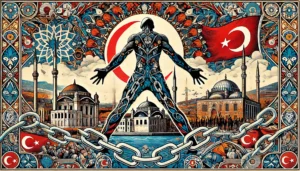Introduction
The phrase “utanmaz türklere” may not be part of everyday language, but its meaning and cultural implications carry a significant weight. Translating to “shameless Turks” in English, this expression is layered with history, cultural nuances, and evolving interpretations. While its roots lie in traditional societal norms, its modern usage paints a broader picture of individuality, rebellion, and boldness. Let’s explore the origins, cultural significance, and how this term continues to spark debate in contemporary Turkey.
What Does “Utanmaz Türklere” Mean?
At its core, “utanmaz türklere” is a term that combines “utanmaz” (shameless) and “türklere” (Turks, in plural form). It is often used to describe individuals whose actions are seen as defying societal norms or exhibiting bold confidence. Depending on the context, this term can carry either a negative connotation—implying disrespect or immorality—or a positive one, applauding fearless self-expression.
In Turkish culture, where the concept of shame (“utanma”) is deeply tied to social expectations, this term reflects a dynamic interplay between tradition and modernity.
The Historical Roots of “Utanmaz Türklere”

The origins of the term can be traced back to the Ottoman Empire, a period known for its rich cultural heritage and diverse societal norms. During this time, individuals who challenged the strict moral codes or societal expectations were often labeled as “shameless.” However, the perception of shamelessness varied greatly based on the social class, regional customs, and even individual interpretations of morality.
Over centuries, as Turkish society evolved, so too did the meaning of “utanmaz türklere.” From its association with defiance during the Ottoman era to its modern implications, the term has adapted to reflect the shifting attitudes towards individuality and conformity.
Cultural Perspectives: Shame and Boldness in Turkish Society
Shame has traditionally played a vital role in Turkish culture, acting as a cornerstone of social order. It is closely tied to family honor, communal respect, and moral conduct. The label “shameless” is often used to critique behavior that falls outside accepted norms, whether it involves defying parental expectations, engaging in controversial relationships, or challenging authority.
However, modern Turkish society is increasingly embracing a more individualistic outlook. For many, being labeled as “utanmaz” is no longer a mark of dishonor but a badge of courage. It signifies standing up for personal beliefs and breaking free from outdated conventions. This dual interpretation highlights a generational divide: where older generations may see shamelessness as disrespect, younger people may celebrate it as authenticity.
Modern Interpretations of “Utanmaz Türklere”
Today, “utanmaz türklere” has taken on new meanings in a rapidly changing world. Social media, in particular, has amplified the usage of this term. Memes, satire, and digital conversations often feature it to describe bold actions, whether in jest or admiration.
For example, a public figure who challenges political norms or a young artist breaking societal taboos might be playfully or critically labeled as part of the “utanmaz türklere.” In these contexts, the phrase reflects not just shamelessness but also a spirit of defiance and individuality.
Regional and Generational Differences
The interpretation of “utanmaz türklere” varies across regions and generations in Turkey. In more traditional or rural areas, the term might still carry a heavily negative connotation, used to shame individuals who stray from established customs. In contrast, urban centers with progressive attitudes are more likely to use it humorously or even positively.
Generationally, older people often associate the term with immorality, while younger individuals may view it as a symbol of empowerment and self-expression. This divergence underscores the evolving nature of cultural values in Turkey.
Representation in Literature and Media
The term “utanmaz türklere” has also found its way into Turkish literature and media. While it is rarely a central theme, its implications are often woven into narratives exploring societal tensions. In novels and films, characters who defy societal norms or challenge authority may embody this concept, serving as a critique of traditionalism or a celebration of modernity.
Pop culture has further expanded its reach. Turkish comedy and satire frequently play with the idea of shamelessness, using it to highlight the absurdity of rigid moral standards or to critique hypocritical behavior.
Comparative Insights: Similar Concepts in Other Cultures
The idea of shamelessness is not unique to Turkish culture. Across the world, societies grapple with the balance between conformity and individualism. For instance:
- In Japan, the concept of “haji” (shame) plays a similar role in maintaining social harmony.
- Western cultures often frame boldness and defiance as virtues, particularly in the context of challenging oppressive systems.
These comparisons reveal that while the label “utanmaz türklere” is culturally specific, its underlying themes resonate globally.
Psychological and Societal Implications
Psychologically, being labeled as shameless can have profound effects. For some, it may cause feelings of alienation and guilt, particularly in conservative settings. For others, it can serve as a motivator to prove critics wrong, fostering resilience and determination.
On a societal level, the term reflects the tension between tradition and modernity. As Turkey continues to modernize, the cultural significance of “utanmaz türklere” will likely evolve further, reflecting the country’s shifting values.
FAQs About “Utanmaz Türklere”
Q: Is “utanmaz türklere” always used as an insult?
A: Not necessarily. While it often carries negative connotations, in some contexts, it is used humorously or even admiringly to describe bold and fearless individuals.
Q: Why is shame so important in Turkish culture?
A: Shame is closely tied to family honor, communal respect, and moral conduct, making it a key component of social harmony.
Q: How is the term perceived by younger generations?
A: Younger generations often see the term as a symbol of individuality and freedom, rather than a critique of moral conduct.
Conclusion: The Evolving Meaning of “Utanmaz Türklere”
“Utanmaz türklere” is more than just a phrase; it is a window into Turkey’s cultural and societal dynamics. From its historical roots to its modern interpretations, the term embodies the ongoing tension between tradition and individuality. Whether used critically or playfully, it continues to spark conversations about identity, values, and the role of shame in shaping behavior.
As Turkey evolves, so too will the meaning and usage of “utanmaz türklere,” reflecting the nation’s journey toward balancing its rich cultural heritage with the demands of a modern, globalized world.








